Purple
News: Remembering Sir Tim Brighouse - former Peeple Trustee
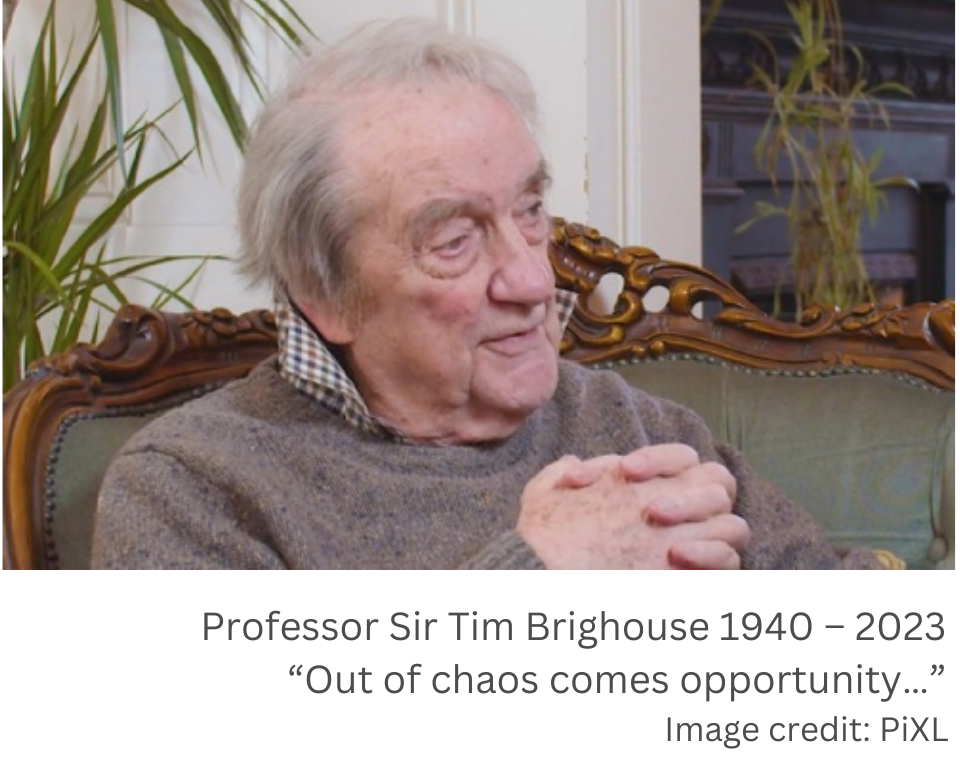 We were very sad to hear of the death of Professor Sir Tim Brighouse on 16 December 2023. Tim was one of the great minds behind Peeple, set up in 1995 with the audacious plan to improve education outcomes of children at secondary school, by working with their parents from birth. Mike O’Regan, our founder, recalls how Tim (then Oxfordshire’s Chief Education Officer) responded to the idea with his characteristic enthusiasm and supportive energy and helped give PEEP (our former name) its confident start.
We were very sad to hear of the death of Professor Sir Tim Brighouse on 16 December 2023. Tim was one of the great minds behind Peeple, set up in 1995 with the audacious plan to improve education outcomes of children at secondary school, by working with their parents from birth. Mike O’Regan, our founder, recalls how Tim (then Oxfordshire’s Chief Education Officer) responded to the idea with his characteristic enthusiasm and supportive energy and helped give PEEP (our former name) its confident start.
Tim went on to serve as a trustee until 2014. During this time, we benefitted from his kindness and warmth as well as his wisdom, extraordinary breadth of experience and, when needed, his firmness and authority. We were lucky to have him – clearly a feeling shared by (almost!) everyone he worked with or who enjoyed correspondence with him, judging by the personal and poignant comments shared recently in the press. I didn’t know whether to laugh or cry when I read this letter from a Nursery Teacher in the Guardian: “I once wrote to Tim in despair about the effect of some educational ‘reform’ on my nursery class. He replied by return post and advised me to collect all the relevant paperwork, set fire to it in the garden and dance around it. ‘It won't make any difference, but it might make you feel better’ he wrote. His letter certainly did.”
Sally Smith
Peeple CEO
News: Sir Tim Brighouse RIP - former Peeple Trustee
Feature box colour:
Side Quote Color:
blog: peep delivery in a post-covid world
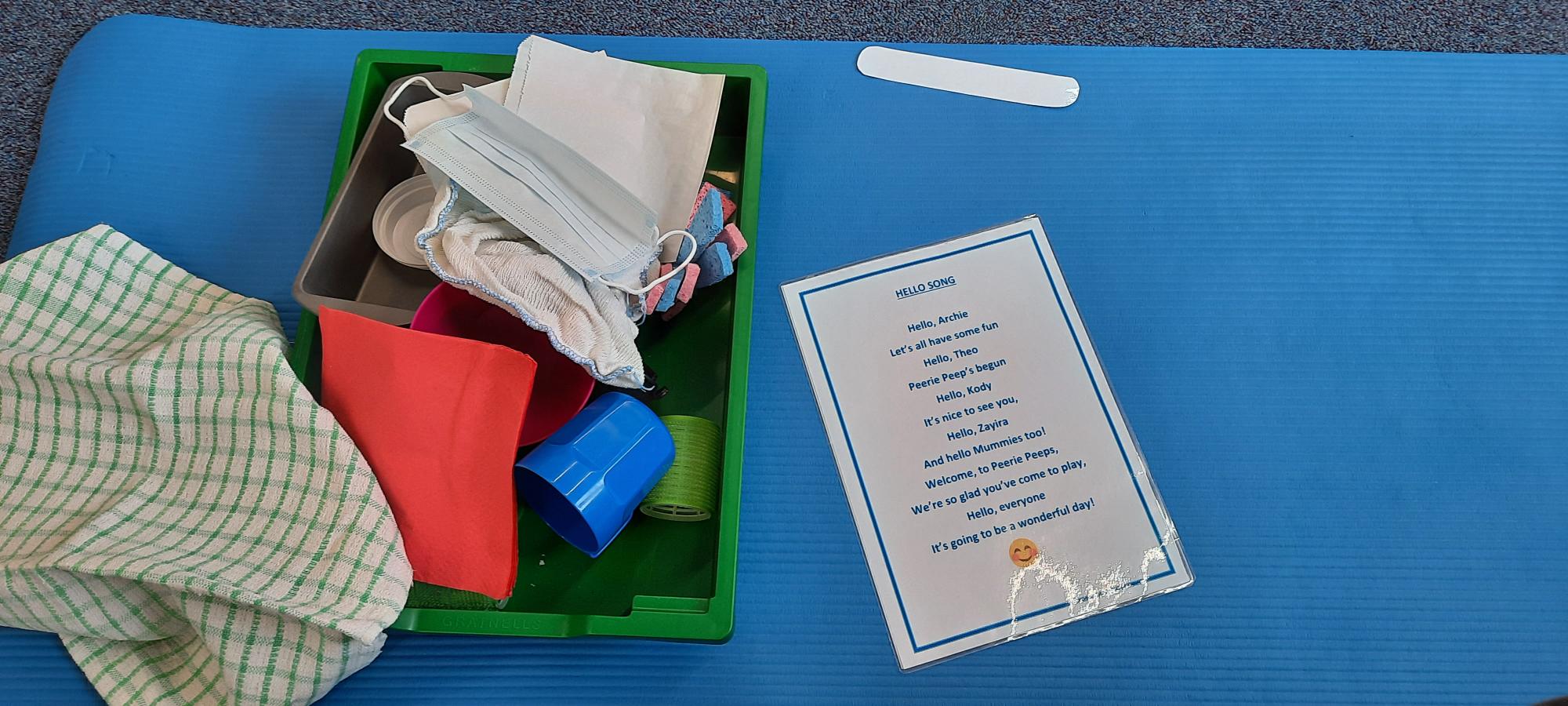 During the Covid pandemic, delivery of Peep sessions switched to virtual as practitioners committed to finding new ways to reach parents who needed support. This way of delivery was very successful, with high levels of engagement reported. As restrictions have eased, some practitioners have flagged up anxieties, from themselves and families, about returning to face to face sessions. A common question has been about what measures to put in place to encourage group cohesion whilst still respecting personal feelings surrounding Covid.
During the Covid pandemic, delivery of Peep sessions switched to virtual as practitioners committed to finding new ways to reach parents who needed support. This way of delivery was very successful, with high levels of engagement reported. As restrictions have eased, some practitioners have flagged up anxieties, from themselves and families, about returning to face to face sessions. A common question has been about what measures to put in place to encourage group cohesion whilst still respecting personal feelings surrounding Covid.
Becky Robertson is a Family Support Worker at the Shetland Family Centre and moved back to face to face sessions in May 2021, before most of the country. Here is her experience:
I work in a family centre which is not registered with the Care Inspectorate; it doesn’t come under education or schools legislation either – we are a bit of an anomaly really! It means that our parent groups are considered to be under the ‘support group’ or ‘parent and toddler group’ umbrella, which enabled us to deliver in-person from May 2021. This was fantastic, but restrictions were still quite tight in some respects and anxieties around Covid were very high for staff and families.
We started with a pilot group of just three families and two workers, which still felt like loads of people to have in one room at that stage! According to the restrictions relating to social distancing (then 2 metres), the room we were using could hold a maximum of eight adults, but even that amount felt really strange at first.
We adopted some subtle tools to social distancing, without it feeling awkward, and found these really helped to make people feel more relaxed in the ‘new normal’:
Invested in yoga mats for the families to sit on
At 1.5m long it meant that once the mats were spaced out on the floor people were distanced. We also used name labels on the mats instead of on people, which meant a ‘safe zone’ for each family, and everyone stuck to their own mat.
Individual treasure baskets for each family and used washable shopping bags for ‘What’s in the bag?’
Having the individual trays of toys meant everything was washed after each session and we kept the same colour for each family each week; giving families a sense of security.
Laminated song lyrics
These were wiped down in-between sessions. We even did our best to chant, instead of sing, to reduce concerns for all!
Individual reusable travel cups
I saw this in another Peep group and it worked really well. Parents and carers could decorate them and write their names and preferences and we would have a cuppa ready when they arrived each week - they could also take them home at the end of the block. It proved a great option for us as facilitators, not only because it cut out the anxieties around mug swapping, sharing spoons, etc. but also because we could have it ready in advance.
Small, individual snacks in decorated Tupperware tubs
We got the parents to write on any allergies and filled them with fruit/veg for the groups which clashed with snack time.
As well as these new ideas, we ensured that all rules around Covid were touched upon at the start of the session in the normal ‘housekeeping’ introduction, and hand sanitiser was available at various points around the room.
Now that we are living in a world of no masks, testing, or distancing that all seems pretty strict and historic… but some of the approaches are continuing into the new blocks which started in May:
We still use individual mats for the families, and label them, instead of the people. It means less anxiety for families as they arrive as they don’t have to choose a space, know exactly where they are going and know what to expect. It also means that names are visible at all times; alleviating concerns around forgetting a name or a badge being obscured right in the middle of the 'Hello' song. We continue to work with small numbers, trying to facilitate more families by offering short blocks, as it still feels more comfortable to us at this time, but we now work on the principle of recruiting 5-6 families per block.
My advice would always be to start small and see how it feels and progresses from there; it's always going to be easier once the first block is done and each block will flag up things that worked well, and things that didn’t! Don’t overthink it, remember that the families have no idea if you’re ‘doing it right’ or not; plus they love it when you make a mistake or two - it makes them feel less pressured to be perfect themselves!
For Peep practitioners, head to the members area here for delivery support resources.
Blog: Peep delivery post-covid
Feature box colour:
Side Quote Color:
Blog: Supporting the Peep Progression Pathway - England
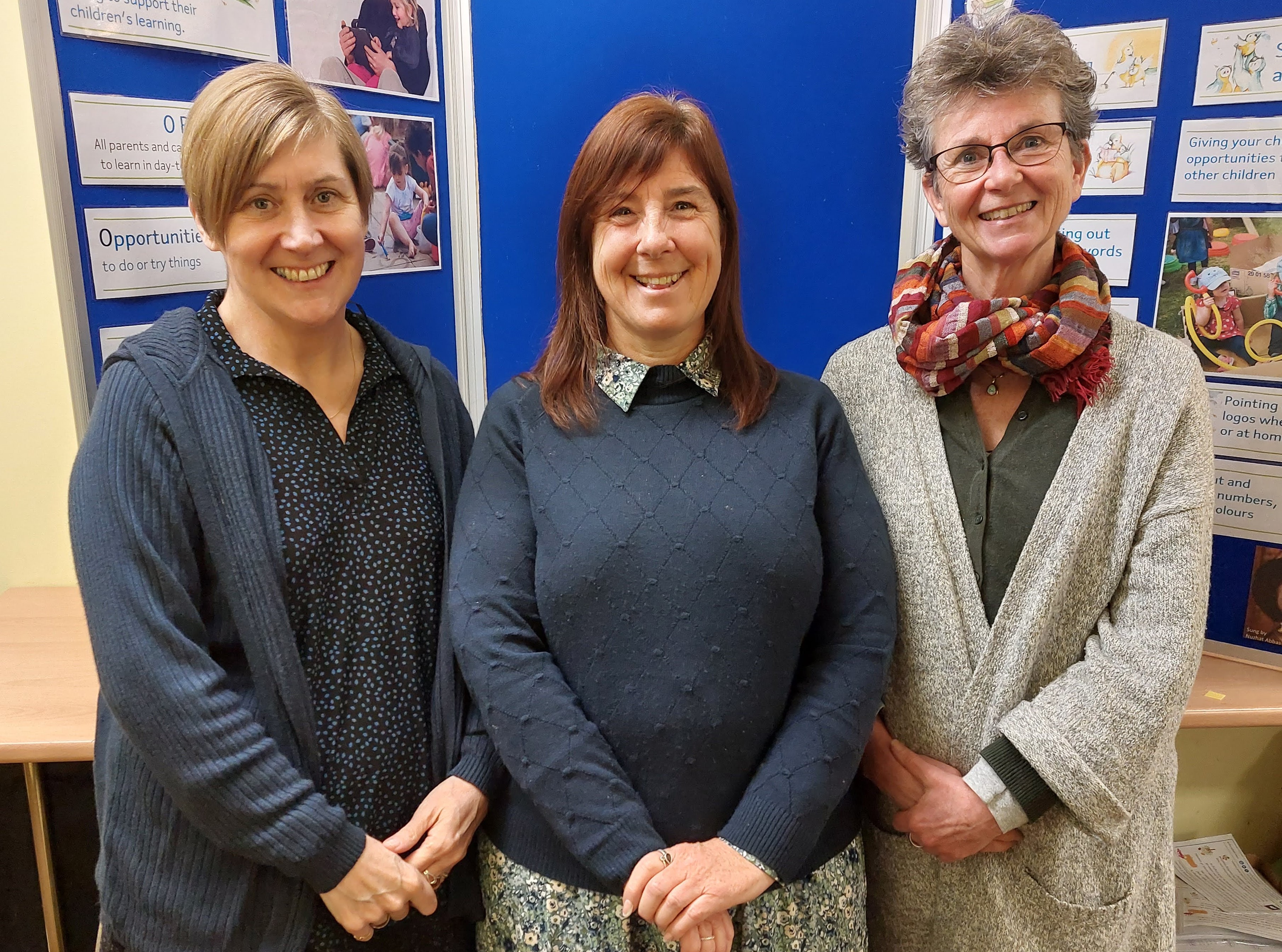 Hi, my name is Debbie Holmes, and I am on secondment as Peeple’s Adult Learning Development Manager for England, supporting the Peep Progression Pathway for parents - alongside my teaching role in a nursery class. (pictured between Peeple Training and Accreditation Manager Liz Ersoy and CEO Sally Smith)
Hi, my name is Debbie Holmes, and I am on secondment as Peeple’s Adult Learning Development Manager for England, supporting the Peep Progression Pathway for parents - alongside my teaching role in a nursery class. (pictured between Peeple Training and Accreditation Manager Liz Ersoy and CEO Sally Smith)
My Peep journey began in 2010 when I became a Children’s Centre teacher in Leicester, and it has shaped and formed my practice ever since. I became a Peep practitioner delivering groups to parents, carers and their children from birth to 5 years in different schools, centres and shelters. I soon saw the power and magic behind the Peep Learning Together Programme in supporting parents to understand their child’s communication and development needs.
The simple yet key messages delivered in Peep sessions show parents that everything they do with their children from birth (and even before, through the Peep Antenatal Programme) supports brain development, language acquisition and secure attachments at a time when their children’s capacity to learn is optimal.
The power of Peep groups is the delivery of simple, high impact messages, highlighting children’s learning through observation, and sharing these observations with parents. Soon parents were able to spot learning in everyday situations for themselves, and from this point they could build up a picture of their child’s preferred learning styles, interests and strengths whilst also developing their child’s language and skills effortlessly.
Many of the parents attending Peep sessions made amazing memory books or learning journals to share with their children and record their joint learning journey. This led naturally into supporting parents back into their own education, as their Peep journals could be used in the parent accreditation that we offer through our Peep Progression Pathway - nationally recognised units which cover three qualification levels for parents and carers as learners, and which formally recognises the learning which is already occurring within a Peep session.
My job as practitioner was to guide parents on this journey. It is a very humbling experience, watching a parent and child grow and learn together. This passion continued with me when I returned to teaching in schools, where I introduced Peep groups to support the transition for parents and their children who were starting school. I wish I had known what I know now when my children were young!
When I saw the role with Peeple for an Adult Learning Development Manager I was so excited to be a part of its development and growth, and even more excited to be welcomed on board. Every parent wants the best for their child, but there is no manual attached at birth! Peep offers a supportive non-judgmental environment where parents can learn how to support their children and connect with peers who they often form lasting friendships with. Look out for groups near you in family hubs, libraries, schools and other community venues, and if there aren’t any, ask your Local Authority.
We are very proud of our updated Peep Progression Pathway, which supports parents to achieve qualifications at three levels - up to level 5 in Scotland and level 2 in the rest of the UK - a gateway into childcare and other related courses and jobs. Get in touch with myself or my colleague Laura Niven (Qualifications Manager Scotland) to find out more about how to continue your learning journey with Peep!
email: pathway@peeple.org.uk | website: Peep Progression Pathway | Peep Progression Pathway Training for Practitioners
Blog: Supporting the Peep Progression Pathway in England
Feature box colour:
Side Quote Color:
News: Narrowing the attainment gap - Peep Learning Together Study update
Improving children's outcomes...
We already knew that overall the Learning Together Study found that the Peep Learning Together Programme made a positive difference of an additional two‑months progress over a five-month period to children’s early literacy development.
... and narrowing the attainment gap:
However, further analysis has shown that the Programme made the greatest difference to children eligible for Early Years Pupil Premium, who made an additional four months progress in core language skills and in communication, and three months additional progress in early literacy development.
The Learning Together Study was a Randomised Controlled Trial (RCT) of a 20-week version of the Peep Learning Together Programme for three-year olds. It was carried out by Queen’s University Belfast and funded by the Education Endowment Foundation, involving 1447 families from 139 nursery settings across England.
The Peep Learning Together Programme is based on evidence that the quality of learning opportunities within a child’s home environment increases their chances of doing well at school and beyond.
News: Narrowing the attainment gap - Learning Together Study update
Feature box colour:
Side Quote Color:
peep progression pathway training
training aims:
Delegates will learn how to:
- deliver Peep Progression Pathway qualification units for parents/carers within your Peep sessions
- assess learner evidence and give constructive feedback
- use adult learning principles within your Peep delivery
- understand the SCQF processes and paperwork requirements.
who for:
Practitioners with relevant experience (early years, family learning, adult learning, social work, health and/or family support), who have completed our Peep Learning Together Programme Training. This course is also suited to volunteers, parents and student placements who support co-delivery of Peep groups.
> Please note: Before attending training your organisation will need to go through the process of setting up as a Delivery Centre, if there isn't one in your area - find out more about becoming a delivery centre
How to book training:
> Check course dates then complete and return the Peep Progression Pathway Training Booking Form
> Or find out about arranging your own in-house training
Duration: 1-day (9.30 - 3.30pm)
Training price: £160 + vat pp, including online access to Peep Progression Pathway delivery and assessment resources.
Online platform: Microsoft Teams (let us know if you can only use another platform). Delegates should each have a laptop/ computer (or tablet) to use, at home or at work; if this is a problem please let us know in advance.
Please book and send delegate details at least 10 working days before the course.
Find out more about:
> Peep Progression Pathway parent qualification units
> How you could deliver the Peep Progression Pathway units in your area
Join our next free Pathway Information Session for practitioners and managers
to find out more about using the Peep Progression Pathway with your local families
Thur 13 June 3.30 - 4.30pm
> Email us and we'll send you a Teams link for your calendar: pathway@peeple.org.uk
Payment and Cancellation Terms and Conditions: Peep Learning Ltd, the trading arm of Peeple, will invoice you after receiving this booking form. Payment is due within 30 days of invoice date. Fees are only refundable if cancelled more than two weeks before the course. (Peep Learning Ltd Vat Registration no: 768 4173 94)
Contact us with any questions: pathway@peeple.org.uk
peep progression pathway training
to offer parent qualification units in your Peep groups
Feature box colour:
find out more or book training
tel 01865 397 970
training@peeple.org.uk
> dates & booking
> in-house training
> training courses
> sign up to our e-newsletter
Side Quote Color:
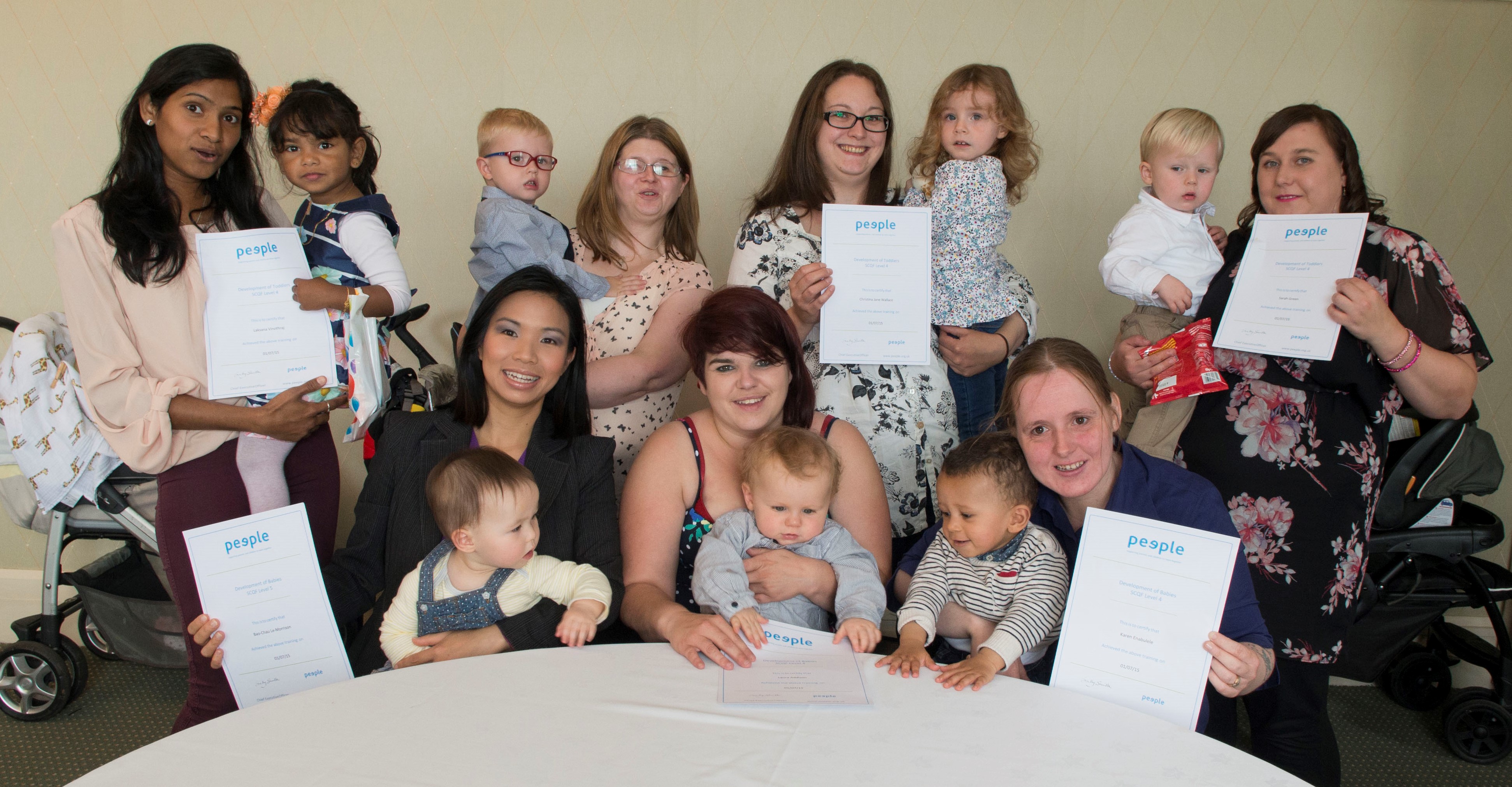
useful links for parents and carers
You can't beat getting together with other families and practitioners to share parenting ideas and experiences - but there are also lots of ideas and information online. Here are a few:
> Peep social media pages - all @PeepleCentre - Facebook ~ Instagram ~ Twitter
> CBeebies' The Baby Club and The Toddler Club - lots of episodes and songs available on the BBC iPlayer, with more being filmed. We've loved being education consultants for these fab series since the beginning.
> BBC Tiny Happy People - lots of great video clips of activities and info, filmed with families.
> Parenting across Scotland - links for free parenting programmes (and other info) across Scottish local authorities.
> Sure Start Partnerships in Northern Ireland - Northern Ireland Sure Starts focus on supporting parents from pregnancy to school with their children's learning skills, health and well-being, and social and emotional development.
> England - The government in England doesn't currently have a centralised webpage with info or links to local Children's Centres (previously known as Sure Start) or Family Hubs. However, Family Hubs are replacing (or re-naming) children's centres, so more will probably appear on the Family Hubs Network website. Local councils also have links to their children's centres and/or family hubs, as well as local Family Information Directories, which provide information about local services.
> Dadvengers - blogs, podcasts and free weekly get-togethers (via instagram live) from Nigel Clarke (The Baby Club presenter and Peep Ambassador), to support dads on their journey through parenthood.
> Play.hooray - lots of playful early learning ideas on Instagram from Peep ambassador Claire.
useful links for parents and carers
Feature box colour:
Side Quote Color:
singing 'ready and...'
'Ready and...' is one of the favourite songs in our Peep groups. The babies and toddlers love the simple tune and actions - and it's amazing how much they're learning at the same time.
Once they've got to know the song, your baby or toddler will start to know what's going to happen next - you might notice it in their face, as they wait during the pause then laugh or look excited as you lift them (or their arms) up and down. Understanding 'what happens next' is an important life skill as children get older.
Action songs are also a great way for young children to learn what words mean, as they move up and down, side to side, backwards and forwards.
If you're not sure of the tune, here's a link: > Ready and... or just make up your own tune. You can find this and other songs on our Singing Together 1 Songbook/ CD/ MP3.
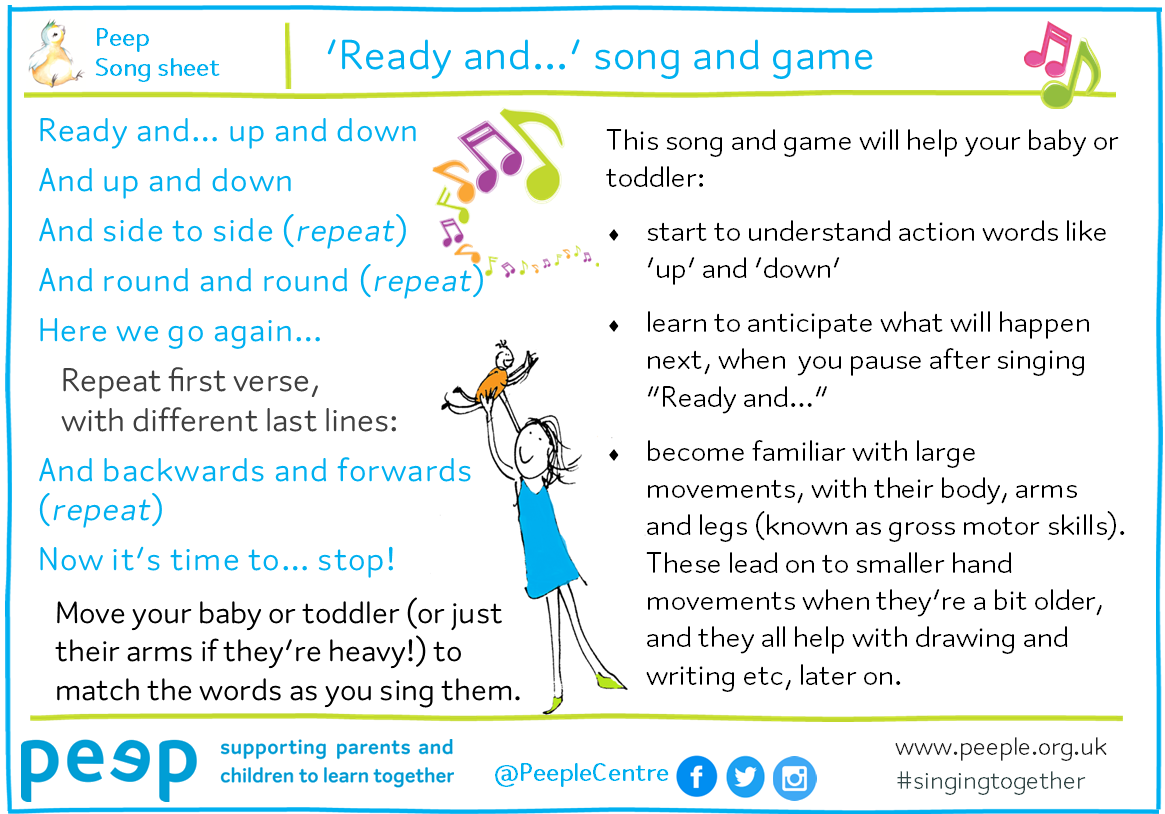
singing together
Feature box colour:
Side Quote Color:
practitioner accreditation
Our Peep Learning Together Practitioner Accreditation values and builds on Peep practitioners’ skills, confidence, knowledge and understanding about working with parents and children to support their home learning environment and enhance children’s outcomes.
Practitioner Accreditation - free Information session
Find out how you or LTP-trained colleagues can complete the Practitioner Accreditation unit
as part of your Peep delivery:
Join our free Practitioner Accreditation Information Session on Wednesday 8th May 3.30 - 4.30pm
> Email us and we'll send you a Teams link for your calendar: pa@peeple.org.uk
What is the Peep practitioner accreditation unit called?
'Supporting parents and children to learn together'
Who is the practitioner accreditation unit for?
Practitioners who have completed Peep Learning Together Programme (LTP) Training
What are the benefits of completing the accreditation?
- Quality of delivery with families: The accreditation embeds the Peep training and Programme into your work with parents and children together, and enhances quality - so it’s valuable even if you already have a higher level qualification.
- Your CPD: It will contribute to your CV and Continuing Professional Development. The accreditation unit has 3 credits, at level 3 in England, Wales and Northern Ireland, equivalent to level 6 in Scotland and level 5 in the Republic of Ireland. (For more detail, see the 'Qualifications can cross boundaries guide', created on behalf of the UK and Ireland Qualifications Frameworks, updated Aug23.)
What does the accreditation involve?
You complete a portfolio based on your Peep plan-do-review cycle, whether you deliver Peep groups, drop-in sessions and/or one-to-one work with families. Your line manager or a colleague will observe one of your sessions and have a follow-up discussion with you – guidance and a form are provided in the log-in Members Area. This observation doubles as quality assurance for your organisation and supervision support for you.
What is the time commitment?
It takes approximately 30 hours, including the Peep LTP training course. You will have up to 9 months to complete from the Accreditation start date that we give you after you have registered. You can submit your portfolio as soon as you have completed it.
Who is the Awarding organisation/ body?
AIM Qualifications and Assessment Group.
How much does the Practitioner Accreditation unit cost?
- £70 + vat per learner, if you have already attended Learning Together Programme Training.
- or £50 + vat pp when purchased alongside the Learning Together Programme Training (LTP Training £450 + Accreditation £50 = £500 + vat pp on booking)
What does the cost include?
This includes the unit's downloadable materials and guidance, 1:1 initial online support call with your assessor, monthly online group support sessions with an assessor, assessment and certification.
How will I be supported to complete my portfolio?
We will assign you an Assessor who will arrange an initial online call with you. There are also monthly online group sessions which focus on aspects of the portfolio, and provide an opportunity to network and build supportive connections with other practitioners.
How do I sign up for the Practitioner Accreditation unit, and when do I need to decide?
The Peep trainers will briefly talk you through the accreditation process during the LTP Training course. We encourage all Peep LTP practitioners to complete the accreditation, but we want you to have time to think about your Peep delivery and the accreditation, before you decide.
When you have booked LTP training and created your login account for the Members Area on the Peeple website, you can read more detail about what's involved, and download the Registration form etc: www.peeple.org.uk/practitioner-accreditation-overview (login for link to work). We’ll also email you with similar information a couple of weeks after you complete your Peep LTP Training.
Practitioners sending their registration form and payment will be given the next available accreditation start date and assigned an assessor, which is when your nine months will begin. We will also give you online access to the Practitioner Accreditation area of the website containing all your accreditation materials, including the portfolio, guidance, policies and key contacts.
When do I need to start by?
You can start as soon as you're ready to start planning your Peep delivery. If you weren't able to start delivery soon after the training, or you're returning to Peep after a gap, the accreditation and plan-do-review portfolio can be a supportive way to get going with your Peep delivery.
How is the Practitioner Accreditation unit assessed?
Completed portfolios are assessed by Peeple’s assessors, and are part of an Internal and External Quality Assurance (IQA/ EQA) process led by AIM, the awarding body. Certificates will be sent to learners once AIM have completed the EQA process.
Get in touch to find out more, or with any questions: email PA@peeple.org.uk
accreditation unit for peep practitioners
> find out more - free online info session - Wed 8 May
Feature box colour:
find out more or book training
tel 01865 397 970
training@peeple.org.uk
> training courses
> in-house training
> dates & booking
> sign up to our e-newsletter
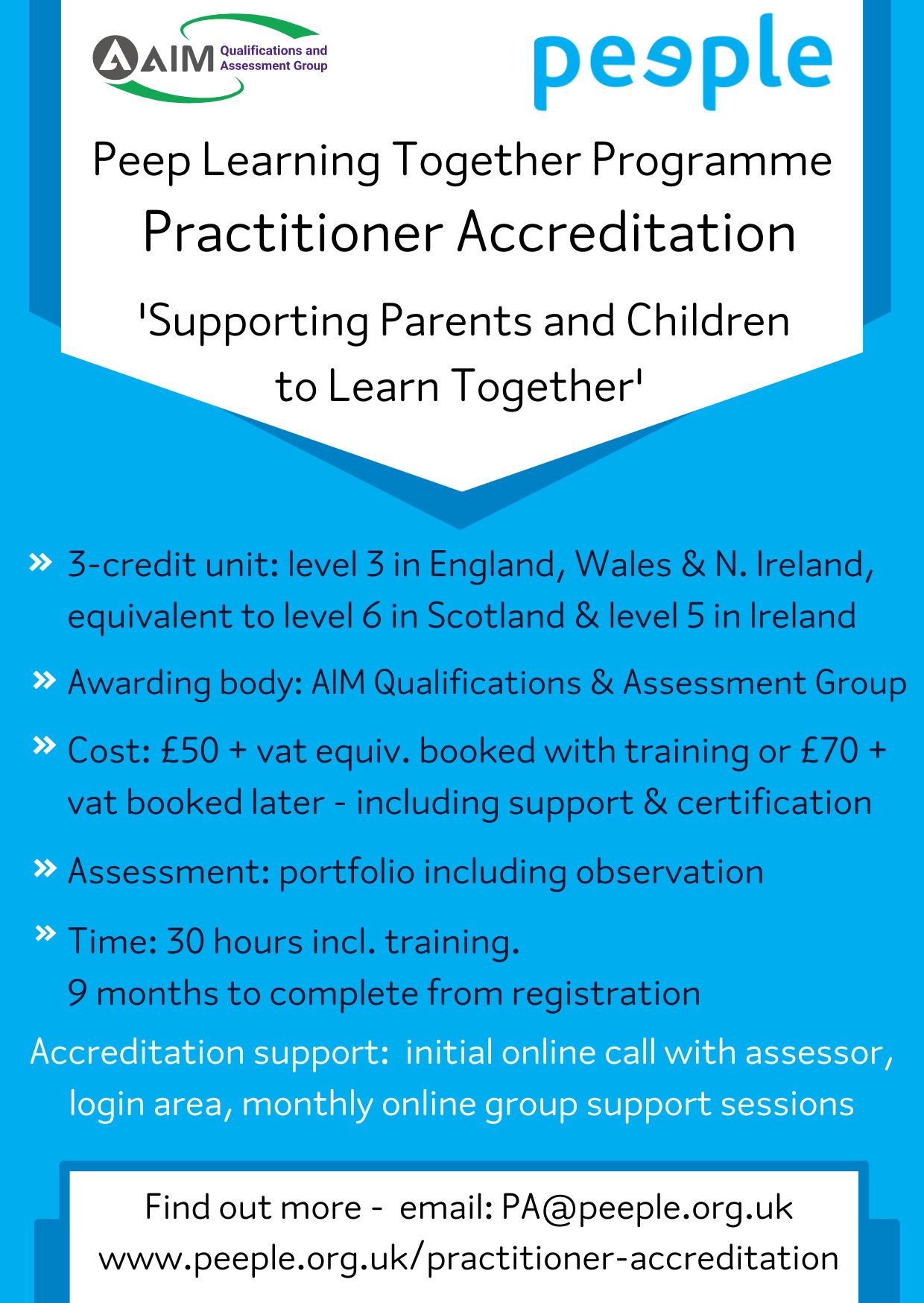
Side Quote Color:
learning together study
The Learning Together Study was a Randomised Controlled Trial (RCT) research study which adds to the Peep Learning Together Programme evidence base. The findings showed that the Peep programme improved children's outcomes and helped narrow the gap in educational achievement. Trained practitioners use the Programme to strengthen parents’ skills and confidence in helping their children to learn through everyday activities.
Improving children's outcomes...
We are very pleased that overall the Study found that the Peep Learning Together Programme made a positive difference of an additional two‑months progress over a five-month period to children’s early literacy development.
... and narrowing the attainment gap:
However, the Programme made the greatest difference to children eligible for Early Years Pupil Premium, who made an additional four months' progress in core language skills and in communication, and three months' additional progress in early literacy development.
The Peep Learning Together Programme is based on evidence that the quality of learning opportunities within a child’s home environment increases their chances of doing well at school and beyond.
Outcomes for parents:
The study also found that the Programme had positive effects on parents, who reported improvements in:
- parental self-acceptance
- the home learning environment
- their confidence in enjoying and playing with their child
- their parenting knowledge and learning.
The large-scale, independent LTS evaluation was carried out by Queen’s University Belfast and was funded by the Education Endowment Foundation. It involved 1447 families with three-year olds from 139 nursery settings, using a 20-week version of the Peep Learning Together Programme across England.
The findings of the Learning Together Study replicate those of the Birth to School Study, a six-year longitudinal evaluation of the Peep Learning Together Programme carried out by the University of Oxford. During the first three years of the evaluation, the Birth to School Study found positive effects on parent/child interactions and the quality of the care-giving environment at home. In the following three years it went on to find an increased rate of progress for the children in a suite of outcomes related to early literacy development.
Watch the 90-second video of Peeple CEO Dr Sally Smith giving an overview of the Study and its findings:
Feedback from practitioners and settings
Other findings of the study showed that more than 90% of practitioners found that the Programme was easy to use and implement and also that it was delivered with high fidelity. Some practitioners felt that the length of the Programme (20 weeks) may have been a barrier for some parents. However, parents who attended at least one session of the Programme, attended on average 70% of sessions. We were pleased by this figure, given the various difficulties that can get in the way of parents attending weekly sessions with their three-year olds.
In addition, the cost to schools of delivering the Learning Together Programme is very low: £31.60 per pupil per year, as averaged over three years.
Practitioners noticed positive changes in the children’s communication, and in relationships and engagement with parents:
'I think the children are more talkative, they’re bringing things in more to school...activities to share or objects to share or books to share, and some of the children were very quiet originally and they’re much more talkative.' (Nursery practitioner)
'The confidence of parents… - as a parent but also...with each other - and their confidence at the nursery, their confidence to approach me and talk to me about absolutely anything and realise that that’s okay, and just they want to join in with things, they’ve attended things in the nursery.' (Nursery practitioner)
Practitioners found the training very useful:
'I thought the training was lovely, I really enjoyed the training, I thought it gave detail, it gave structure, it gave focus. I came away from the training feeling extremely confident about delivering the programme.' (Nursery practitioner)
Feedback from parents
Parents noticed their children's growing engagement with literacy:
'The other session that she’s really enjoyed recently was making a book, which again was something I thought she wouldn’t be interested in at all and she made two in the end…and she sat and read them to herself and she’s really proud of them.' (Parent)
'I mean the other session that he really liked was the environment… with the signs...so at the moment when we go out with the dog, he’s constantly looking for signs everywhere, like logos and things like that.' (Parent)
The study also highlighted the value of parenting programmes being available in the nursery:
'I haven’t done (apart from sort of...early days mum and baby groups, you know) toddler groups, things like that - I don’t think I would have...committed to that sort of thing if it hadn’t been available through the nursery.' (Parent)
We would like to thank the Education Endowment Foundation and Queen's University Belfast for their collaborative approach to working with Peeple on the Study. Its robust nature (as with all studies funded by the Education Endowment Foundation) gives confidence in the findings which make an important addition, both to the evidence base for the Peep Learning Together Programme, but also to the evidence, more broadly, that working with parents to improve the home learning environment is a feasible and effective means to improve child outcomes, particularly for the most disadvantaged.
We'd also like to thank the Sutton Trust and Esmee Fairbairn Foundation for the Parental Engagement Fund, which provided an important stepping stone towards this evaluation by randomised controlled trial.
Finally, we would like to thank all the settings, practitioners, parents and children who took part in the Study. We really appreciate the time and commitment involved and we hope that you will all continue to enjoy learning together!
learning together study:
randomised controlled trial (RCT)
Feature box colour:
find out more or book training
tel 01865 397 970
training@peeple.org.uk
> training courses
> in-house training
> dates & booking
> sign up to our e-newsletter
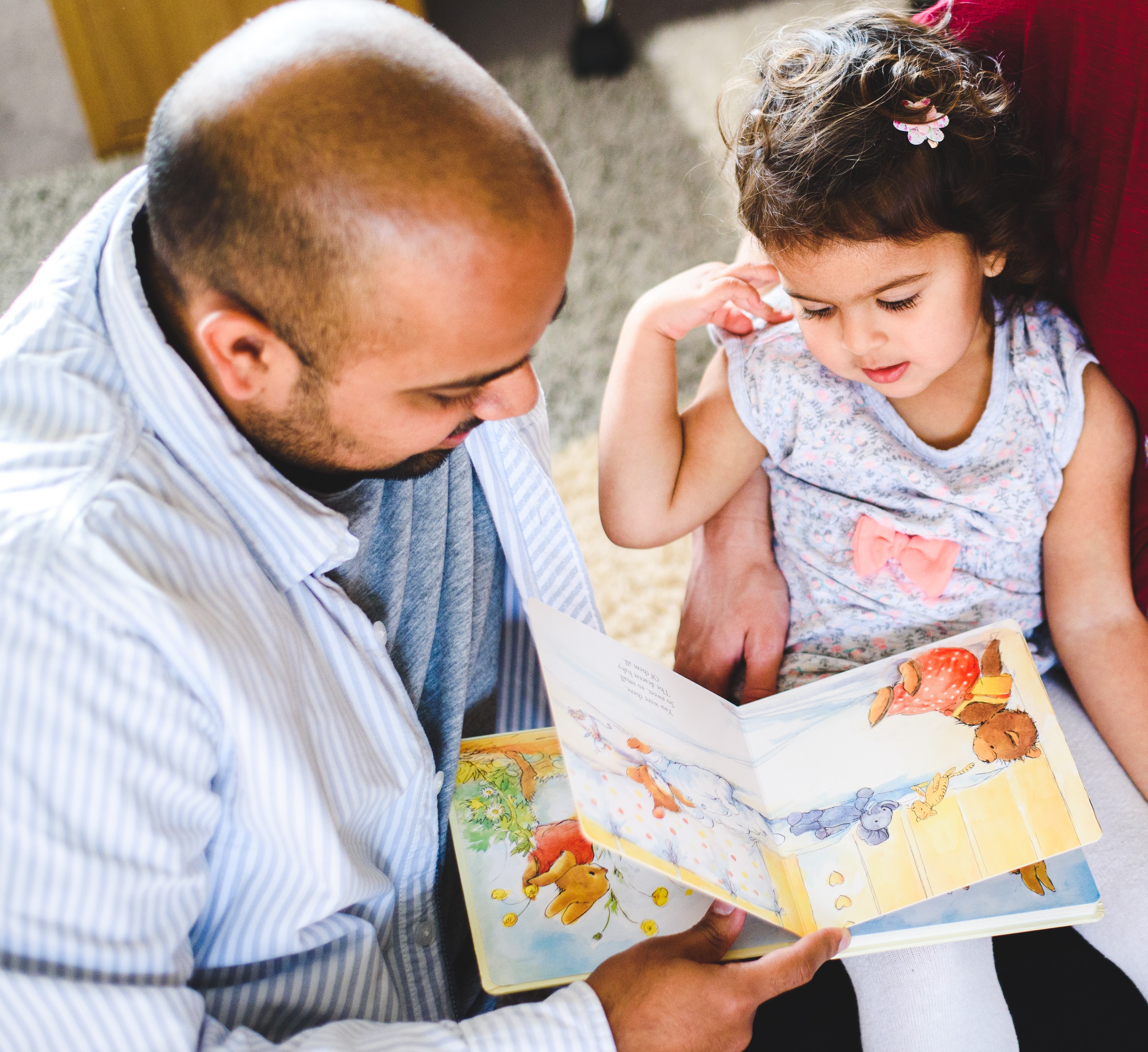
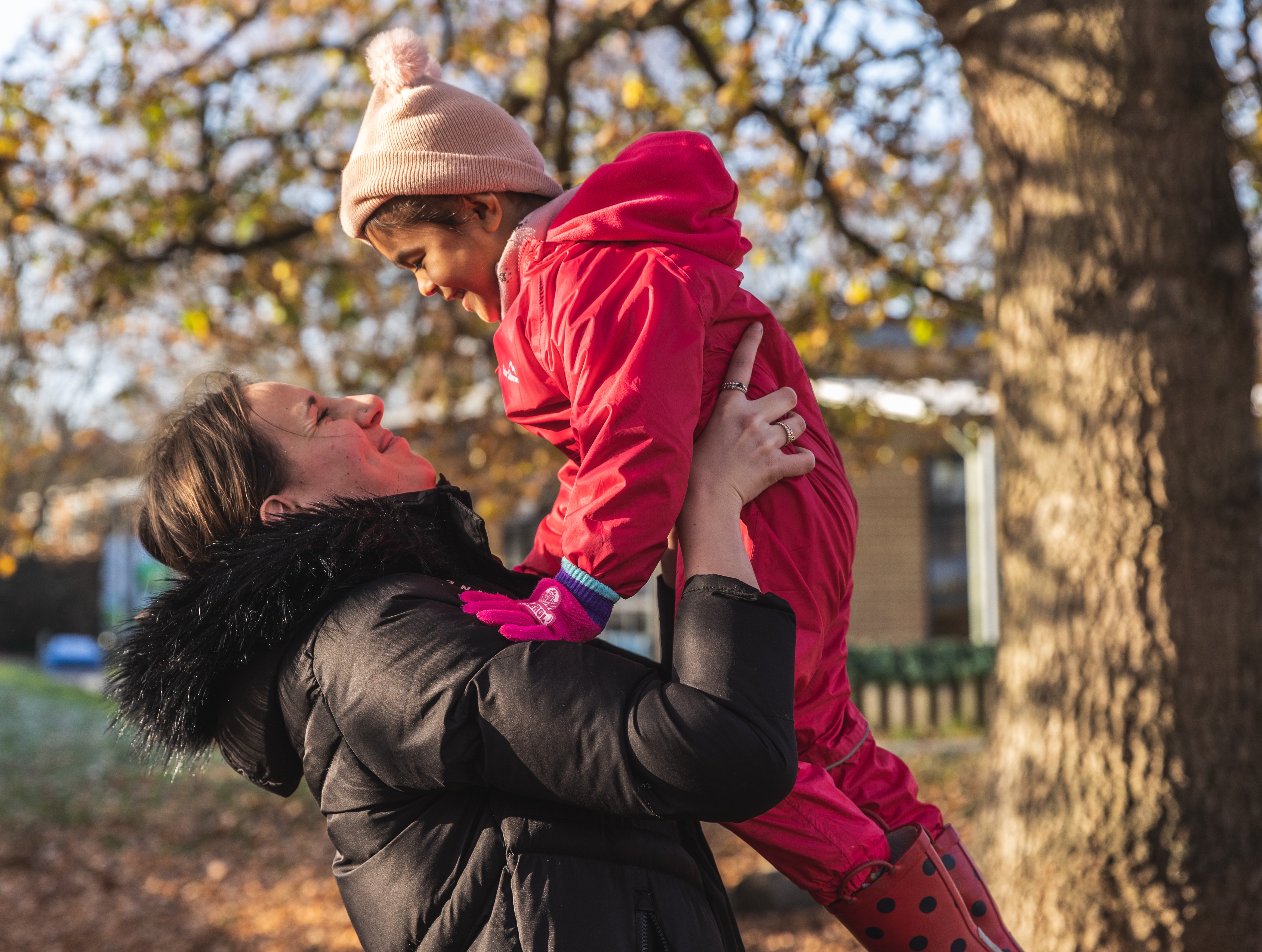
Side Quote Color:
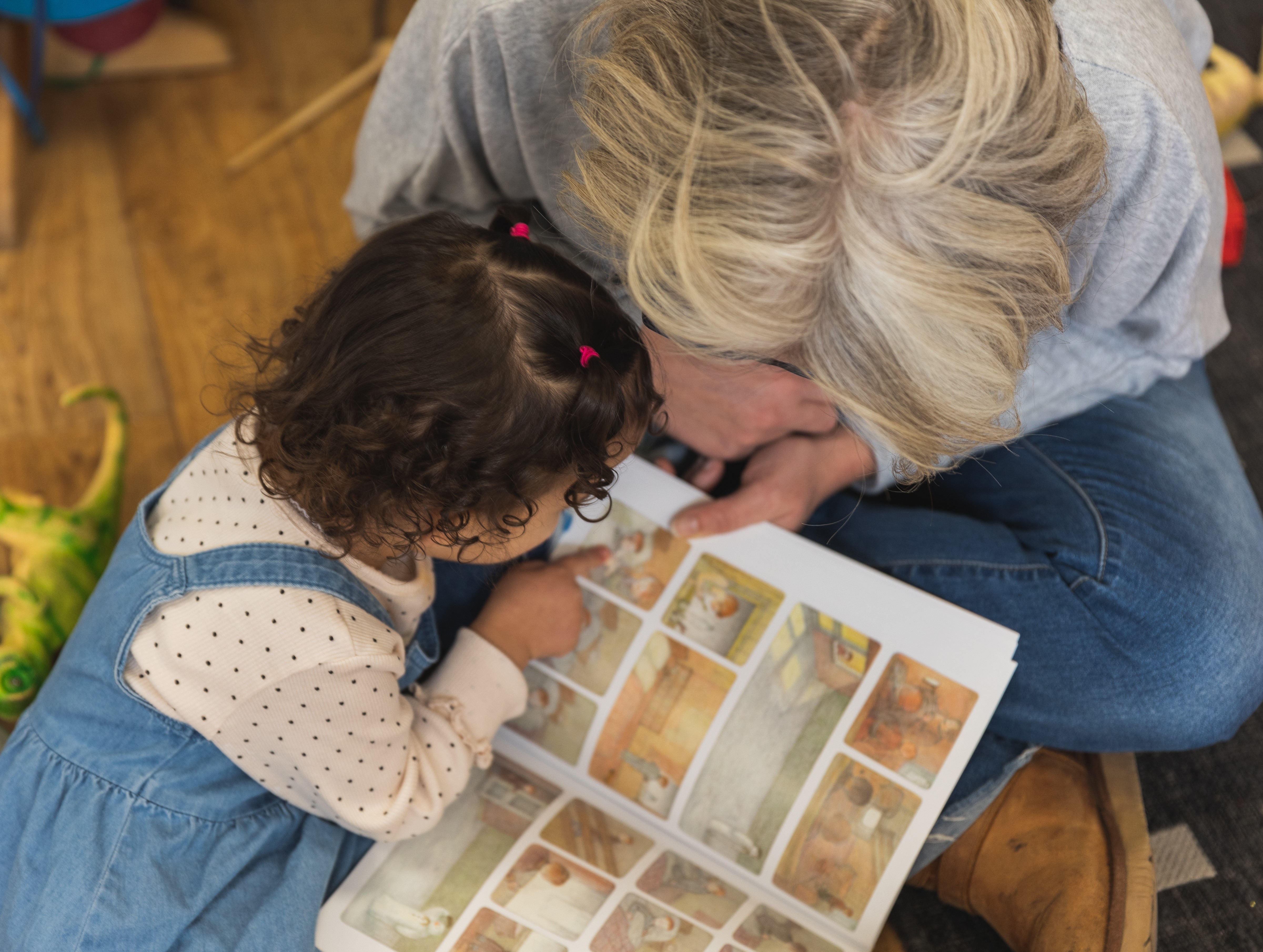
case studies




case studies
how organisations are using peep programmes flexibly to meet local needs
Feature box colour:




